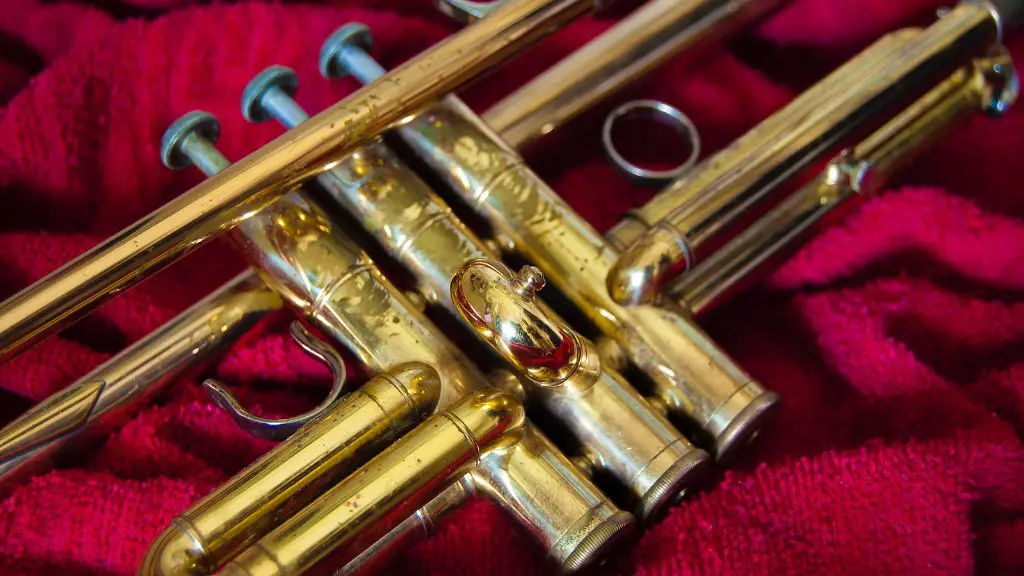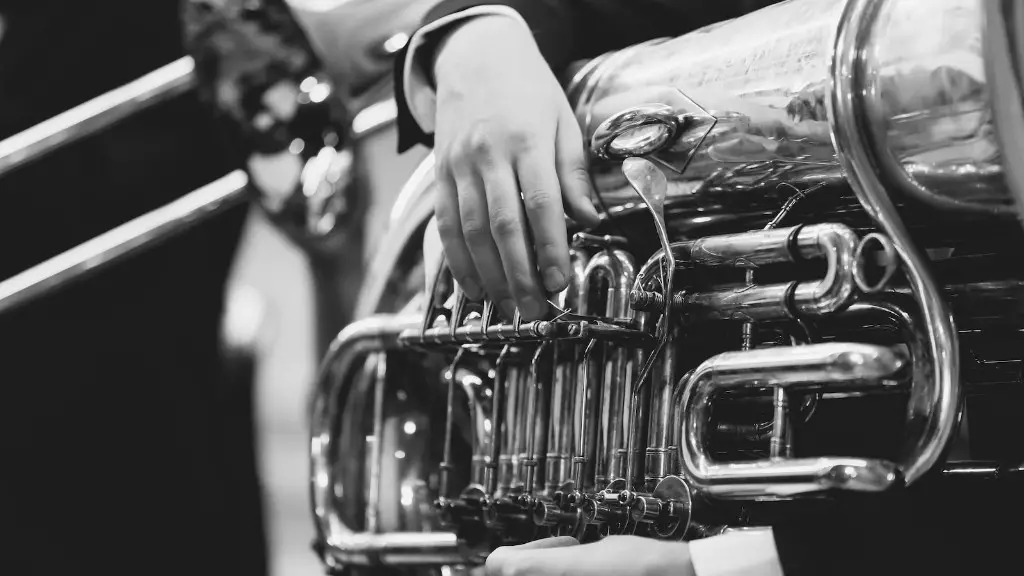Playing a trumpet requires more than just knowledge of how to blow into the instrument. To maintain a trumpet, you should understand basic trumpet care techniques, which includes cleaning and lubrication of parts, inspection for damage, and proper storage.
The most important aspect of trumpet maintenance is cleaning. Make sure to clean the bell and valves regularly with a soft cloth or special brass polish; this will help prevent corrosion and discolouration. Additionally, use a snake brush to clean the inside of the tubing to remove dirt and debris.
It is also important to lubricate all of the moving parts on your trumpet. This will ensure that they move smoothly and that they don’t seize up or become stuck. Use valve oil for the valves and slide grease for the tuning slides.
Finally, inspect your instrument regularly for any signs of damage such as dents or cracks in the body or tubing. If you find any such damages, it is best to take your instrument to a professional repair shop as soon as possible.
In conclusion, proper maintenance of your trumpet is essential if you want it to last for many years. With regular cleaning and lubrication along with regular inspections for damage, you can ensure that your trumpet stays in top condition! **Maintaining your trumpet can also help improve its sound quality**.Clean the trumpet’s mouthpiece with a soft cloth and warm soap and water. Rinse the mouthpiece and dry it thoroughly. Use alcohol or an appropriate cleaning solution to remove any buildup of oil or dirt on the inside of the mouthpiece.
Cleaning Trumpet’s Tuning Slides
Maintaining a trumpet is essential in order to ensure its longevity and playability. The tuning slides are especially important, as they are responsible for the instrument’s main tuning. To clean these components, use a soft, lint-free cloth and a small amount of brass polish. Make sure to get into all of the crevices and corners of the slides, removing any dirt or debris that may be present. After polishing, buff the slide with another clean cloth to remove any excess product. If done regularly, this simple cleaning process will help keep your trumpet in top playing condition.
It is also important to oil the tuning slides periodically to prevent them from sticking or becoming difficult to move. To do this, use a high-quality instrument lubricant applied directly onto the slides with a cotton swab or soft cloth. Make sure not to over-oil them as this can cause problems with intonation. Cleaning and oiling your trumpet’s tuning slides on a regular basis will help keep it in good working order.
Grease the Trumpet Valves Regularly
Maintaining a trumpet is important for preserving its sound quality and longevity. Greasing the trumpet valves should be done on a regular basis, at least twice a year or more often if the instrument is used frequently. This ensures that the valves are in good condition and moves freely when manipulated. To grease the valves, use a high-quality valve oil designed specifically for brass instruments. Apply a few drops of oil to each valve and press them down gently to evenly distribute the oil throughout the instrument. Rotate each valve several times to help it move freely. Afterwards, wipe away any excess oil with a soft cloth.
It is also important to regularly check that all parts of your trumpet are tightened properly and that there are no loose parts or corroded screws or nuts. If any parts are loose or corroded, they should be replaced immediately to ensure optimal performance of your trumpet. Finally, it is important to keep your trumpet clean by wiping it down after each use with a dry cloth. Doing so will help prevent corrosion from forming on its surface and maintain its overall appearance.
By taking care of your trumpet regularly, you can ensure it will last for many years.
Clean the Inside of the Trumpet
To maintain a trumpet, cleaning the inside is an essential part of upkeep. The best way to clean the inside is to use a snake brush and warm water. Start by taking apart the trumpet and removing any corks or valves. Then, fill a sink with warm water and submerge the trumpet parts in it. Use a snake brush dipped in the water to scrub away any dirt or buildup on the inside of each part, including where valves fit into their slots. Once done, rinse off all of the parts with clean water and dry them thoroughly before reassembling your trumpet.
For extra cleaning power, use a mild dish detergent mixed with warm water, but avoid using harsh chemicals as this may damage your instrument. After cleaning, it’s important to lubricate all moving parts with valve oil. This will keep them from sticking or becoming too dry over time.
Maintaining a Trumpet
Maintaining a trumpet requires proper care and attention to the instrument. The most important components to maintain are the trumpet’s pivot points. These are the parts that allow for rotation and movement of the valves and slides, ensuring proper operation of the instrument. To keep these points in good condition, it is important to clean them regularly with a soft cloth to remove dust and other debris. It is also important to lubricate these points with machine oil or valve oil to ensure smooth operation.
In addition, it is important to check for any signs of wear or damage on a regular basis. If any damage is found, it should be repaired or replaced immediately as this can affect the tone and playability of the instrument. It is also important to store the trumpet in a dry area away from extreme temperatures as this can affect its sound quality and lifespan. Finally, it is beneficial to have an experienced technician inspect and maintain your trumpet annually as well as after each performance or practice session.
By taking proper care of your trumpet’s pivot points, you can ensure that your instrument will last for years and provide you with optimal performance every time you play it! Regular maintenance will also help prevent costly repairs in the future.
Lubricating Water Keys
Maintaining a trumpet is essential for peak performance and longevity. One of the most important elements of trumpet maintenance is lubricating the water keys. The water keys on a trumpet are small valves that regulate airflow and prevent moisture from accumulating inside the instrument. Proper lubrication of these valves ensures that they move freely and prevents any build-up of dirt or debris. To lubricate the water keys, use a small amount of valve oil or slide grease to coat the entire surface of each valve. Next, use an old cloth or tissue to wipe away any excess oil or grease. Finally, gently depress each key several times to work the lubricant into the valve stem and ensure that it moves smoothly. By taking the time to properly lubricate your trumpet’s water keys, you can help keep your instrument in top condition.
Disassemble and Reassemble the Trumpet
Maintaining a trumpet is a vital part of owning one and keeping it in top condition. Disassembling and reassembling it regularly can help to ensure that all parts are in working order. The first step is to remove the mouthpiece from the leadpipe. This is done by unscrewing it gently with a pair of pliers. Next, you will need to unscrew the valves and springs from the valve casing. Then, loosen the water key on the side of the main tuning slide.
After this, take off the bell and then take out the main tuning slide, followed by any other slides or tubing present on your instrument. Be sure to keep track of where each piece goes as you take them apart. Finally, you can unscrew all of the brace screws that hold together the various parts of your trumpet.
When reassembling your instrument, start with reconnecting any slides or tubing first and then reinserting them into place. After this is done, put back on all of your valves and springs into their respective slots in the casing. Tighten them back up using a pair of pliers if necessary before screwing back in your leadpipe and mouthpiece.
Once everything is back in place, make sure that all screws are tightened securely and that nothing is loose or rattling around inside your instrument. Check for any air leaks between joints, as this could lead to an issue with sound quality or tuning stability later on down the line. Finally, give everything a good clean with a lint-free cloth before playing again!
To Sum Up
Maintaining a trumpet is a key factor for ensuring it can last for many years. It’s important to clean and lubricate the instrument regularly, and to make sure it is stored in a safe place. Additionally, the instrument should be taken to a professional for regular maintenance checks. By doing these simple tasks, you can ensure that your trumpet will remain in top condition.





